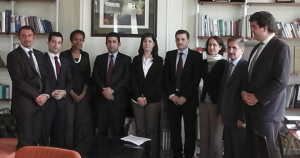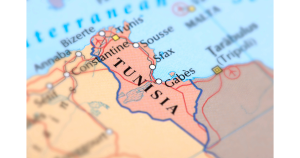Brussels, 7 February 2014
Open letter to the Permanent Representatives to the UN of the countries and International Organisations who attended the opening ceremony of the Geneva II Conference in Montreux on 22 January 2014.
Your Excellency,
I write on the eve of the resumption of the “Geneva II” negotiations to raise some points that we believe are of critical importance to the success of the negotiations and to bettering the situation for the people of Syria. No Peace Without Justice has been working on the Syrian situation since the conflict began and has a team in Gaziantep, Turkey, working with Syrian activists within civil society and the opposition institutions on a range of human rights and accountability issues. Our comments are based primarily on that experience, alongside years of work in various conflict and post-conflict situations around the world.
So far, while the Geneva negotiations have not yet yielded the hoped-for results, at least they have prompted both Syrian negotiating parties to acknowledge that the Syrian people are suffering. More importantly, in the words of Special Joint Representative Brahimi, the parties have reached an understanding “that the humanitarian situation of the population must be addressed rapidly, on the basis of need alone, wherever such need exists in the country”. These are important developments that are essential for the beginning of the end to the crisis.
Nonetheless, the plight of the Syrian population remains enormous and continues to deteriorate at an alarming rate. According to OCHA, around 9.3 million people are in urgent need of humanitarian assistance, including 6.5 million people who are internally displaced. In his first report on the situation of children and armed conflict in the Syrian Arab Republic (S/2014/3), published few days ago, the UN Secretary-General reports on the “countless killings and the maiming of children” and numerous violations of children’s rights. Since November 2011, the UN’s independent international Commission of Inquiry has documented patterns of summary executions, enforced disappearance, torture, rape and other sexual- and gender-based violence, forced displacement, starvation and city blockades. Several UN Security Council Resolutions, relevant decisions of the Human Rights Council, and the Geneva Communiqué of 30 June 2012 have put a strong emphasis on accountability and made clear that there should be no impunity for the most serious crimes under international law. Despite all this, we are facing a humanitarian catastrophe and a political debacle which need to be addressed promptly and decisively.
What is happening in Syria is a humanitarian and human rights disaster. The link between the humanitarian and human rights situation is clear: people have a right to food, medical treatment and to security. They also have a right to express their opinions, live their lives and elect freely their own representatives. However, the people in Syria are able to enjoy none of these rights. Furthermore, as is so often the case, it is the civilians who are bearing the brunt of the conflict, particularly Syria’s women and children.
The Syrian Government bears primary responsibility for the protection of civilians and facilitating assistance to them, as does the Syrian opposition in areas under their control. This is a basic principle of international law and is reinforced in several UN Security Council Resolutions, calling for aid to reach those who need it and calling on the parties to adhere to their obligations under international law. Those who fail to protect civilians or facilitate assistance are violating International Humanitarian Law and should be held responsible for their actions. The failure to fulfil these obligations is itself a political failure of the international community.
The lack of focus on accountability for anyone for what is happening in Syria – be it for crimes under international law or failure to adhere to international legal obligations as prescribed in general law and by the UN Security Council – creates a situation where impunity is the norm. Impunity breeds more violations as people see an “easy” way to reach their objectives. As with situations all around the world since time immemorial, the consequences fall not on those who are breaking the law, but on those whom the law should protect, namely the civilian population of Syria, particularly those in areas where aid cannot reach.
There is much more that the international community, including Special Joint Representative Brahimi, can do to help resolve the situation. The resumption of the negotiations in Geneva on 10 February has to be the venue where the humanitarian and the political tracks are finally considered as closely intertwined. Compliance with UNSC Resolutions and providing humanitarian access to starving civilian populations should be the basis and starting point for negotiations, with negative consequences for non-compliance. The Geneva Communiqué of 30 June 2012 already listed immediate and full humanitarian access to all areas affected by the fighting as a critical step for the full implementation of its provisions. Furthermore, as the Council emphasised in its 2 October Presidential Statement, “the humanitarian situation will continue to deteriorate in the absence of a political solution to the crisis”.
As a participant at the Montreux Conference, your country committed itself to the 2012 Geneva Communiqué. We are certain that you can play a role to help achieve the stated results of the conference and assist the Syrian people to enjoy their civil, political, social, economic and cultural rights. To that end, we are pleased to share some specific suggestions that could help make a contribution to ensuring that the new round of negotiations will yield concrete and measurable results and will help alleviate the ongoing humanitarian disaster in Syria.
We would therefore recommend that next week’s negotiations focus on three main priorities, which are among those put forward by the High Level Group on Humanitarian Challenges in Syria on 3 February 2014 and which can start the implementation of the Geneva Communiqué, notably:
Priority one: All parties should adopt a Declaration of Commitment to the core obligations of International Humanitarian Law and the fundamental principles of humanitarian assistance. By confirming their engagement and willingness to abide by international law, several UN Security Resolutions, the Geneva Communiqué and the 2 October Presidential Statement, the negotiations will reinforce the concept that political and humanitarian tracks cannot be disjoined and that the appalling suffering imposed on the Syrian population has to stop.
Priority two: All parties should agree on immediate arrangements for the entry of adequate and unfettered humanitarian assistance in all besieged areas, the most urgent being the Old City of Homs, Nubl and Zahra, Mohadamya, Yarmouk, Eastern Ghouta, Darayya and Al-Janubiah. A country-wide agreement on these fundamental rights of all Syrian citizens – regardless of their geographical location, creed and gender – will help avoid decisions being taken on the basis of military and political strategies of the warring parties and promote their being taken solely on the basis of the need of civilians.
Priority three: All parties should also agree on an immediate full demilitarisation of schools and hospitals. Examples of such facilities include the Al-Nabk and Al-Basel Hospitals in rural Damascus and the public health compound in Aleppo. Ensuring that primary public services such as education and health are preserved and restored is a primary demand of the Geneva Communiqué and a swift decision on their demilitarisation will represent a further step by both parties to commit to a political solution respectful of the needs and desires of the Syrian people.
The negotiations that will resume on Monday 10 February as well as the scheduled briefing at the UN Security Council on the humanitarian situation in Syria by H.E. Valerie Amos on 13 February will be crucial moments for ending the suffering of the Syrian population and for providing them with some hope. We are certain that your delegation will provide help and support to the negotiations to succeed and reach a political solution to the war. We stand ready to support you in any way that you may consider useful,
Please accept the assurances of our highest considerations,
Niccolò Figà-Talamanca
Secretary-General
No Peace Without Justice
NPWJ’s Syria Project on Justice and Accountability
NPWJ project aims at reducing the expectation and rewards of impunity and at building a culture of accountability. The purpose is to equip citizens to demand accountability and justice for violations taking place on a daily basis for the past two and a half years and, at the same time, to equip the judiciary and legal profession to answer that demand. The mainstay of the project is a series of advocacy and training events, which are being held in Gaziantep, Turkey, near the Syrian border, with Syrian judges, lawyers and civil society activists from Syria who can bring the skills and (perhaps more importantly) aspirations for justice back to their work and their constituents inside Syria. The long-term goal of this project is to promote democracy and human rights protection through incorporating justice and accountability in decision-making on conflict resolution and stability, development, and reconstructing planning in Syria. The project’s strategic objective is to support Syrian civil society playing an active role on justice and accountability issues, including advocacy and documenting human rights violations, including receiving, gathering, collecting, collating, processing and securely storing information, documentation and materials and analyse it for the purpose of establishing what happened and reconstructing decision-making processes that resulted in violations international humanitarian and human rights law in Syria since March 2011.
- Visit the special page dedicated to NPWJ’s Syria Program on Justice and Accountability
- For further information, contact Hadi Al-Khatib on hadi@npwj.org or Nicola Giovannini on ngiovannini@npwj.org or +32-2-548-3915.




